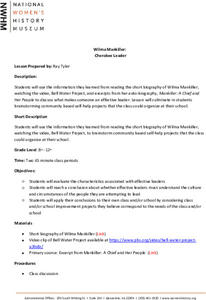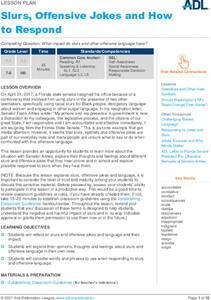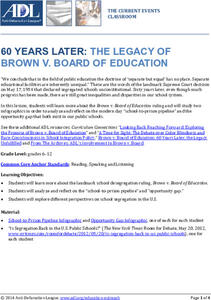University of North Carolina
Congress and the Legislative Process: A Simulation in How a Bill Becomes a Law
As part of the study of the legislative process, scholars research redistricting and gerrymandering and the effects of these activities on lawmaking. On day one of the two-day plans, individuals redistrict the state of Elbonia so that...
K20 LEARN
Ancient Philosophy: Greeks or Romans?
While often not recognized, the ideas of ancient Greek and Roman philosophers still echo today. Using a series of videos and graphic organizers, individuals explore how ancient Greeks and Romans have influenced current Western political...
K20 LEARN
Globalization Since 1945
Using sources from various publications and a series of videos, pupils consider the global economy and the positive and negative effects of globalization. With a jigsaw discussion and a writing assignment, scholars weigh in on whether...
University of Minnesota
Brain Zoo
Who doesn't love a day at the zoo? Use an observation and inference lab to get young anatomists to recognize similarities between mammalian species based on brain structures. You provide the brains; this lesson provides set-up...
Academy of American Poets
Teach This Poem: "The Metier of Blossoming" by Denise Levertov
Poetry analysis need not be a lugubrious exercise for young learners. The approach used with Denise Levertov's poem, "The Metier of Blossoming" is one of close observation, of noticing and reflecting on the words, phrases, and images the...
Academy of American Poets
Teach This Poem: “Crisscross” by Arthur Sze
Arthur Sze's poem "Crisscross" launches a activity that asks scholars to use their observation skills. They first draw an image that reflects what crisscross means to them. They then examine a photograph of a lightning strike and list...
Academy of American Poets
Teach This Poem: "Instructions on Not Giving Up" by Ada Limón
What do the myth of the phoenix bird and Ada Limón's poem "Instructions on Not Giving Up" have in common? Young scholars create a list of what they notice about both the myth and poem, then consider what the similarities might indicate...
Academy of American Poets
Teach This Poem: "somewhere i have never travelled,gladly beyond" by E. E. Cummings
Scholars engage in a role-play exercise, compare their demonstration to a time-lapse video, and to a poem by E.E. Cummings. The ensuing discussion asks learners to consider the similarities among the three.
Academy of American Poets
Teach This Poem: "Once the Magnolia has Blossomed" by Ed Roberson
A free write, an image of magnolia leaves, and the Ed Roberson's poem "Once the Magnolia has Blossomed" ask scholars to use their noticing skills to reflect on the lesson plan beauty teaches about loss and grief.
Academy of American Poets
Teach This Poem: "Lines Written in Early Spring" by William Wordsworth
William Wordsworth's poem "Lines Written in Early Spring" lets learners sharpen their observation skills. Class members first closely examine the image "Flowers in Front of an Abandoned House in Demerino, Russia," listing what they...
Utah Education Network (UEN)
Character Changes Lesson and iPad Assignment
Round, flat, static, dynamic. As part of a characterization study, scholars review the different types of characters and create a slide show demonstrating how a dynamic character in a story they have read changes throughout the tale.
National Endowment for the Humanities
Shakespeare's Julius Caesar: Leadership and a Global Stage
Shakespeare's Julius Caesar is, among other things, the study of a ruler's ambitions. Young scholars watch videos, read articles, and keep a Commonplace Book while studying the play. At the end of Act III, pupils stage the play that...
National Endowment for the Humanities
"From Citizen, VI [On the Train the Woman Standing]," Claudia Rankine
Claudia Rankine's poem "From Citizen, VI [On the Train the Woman Standing]," asks readers to consider direct and more subtle forms of prejudice. After discussing the format of the poem, its tone, and the emotions expressed, class members...
Academy of American Poets
Incredible Bridges: “Cotton Candy” by Edward Hirsch
Read it, hear it, see it, do it! Young poets experience Edward Hirsch's memory poem, "Cotton Candy," by first closely reading the poem silently, then aloud, watching a video of the poet reading it, and crafting their memory poem of an...
National Woman's History Museum
Dolores Huerta: The Life and Work of a 20th Century Activist
Extra! Extra! High schoolers read about Dolores Huerta, the social activist who helped organize the United Farm Workers. Researchers read primary and secondary sources about Huerta's work and craft a headline, supported by three pieces...
National Woman's History Museum
Gloria Steinem, Feminism and “Living the Revolution"
Excerpts from Feminine Mystique by Betty Friedan and from Gloria Steinem's "Living the Revolution" provide high schoolers an opportunity to study the feminism of the 1950s and 1960s, sometimes called the "Second Wave of Feminism."
National Woman's History Museum
Dolores Huerta and the Delano Grape Strike
Few have heard of Dolores Huerta and her part in organizing the California farm workers, establishing the United Farm Workers union and orchestrating the Delano Grape strike. High schoolers consider why this powerful woman has been...
National Woman's History Museum
Women, Education, Sports, and Title IX
Title IX did more than change the face of sports in the United States. This landmark legislation also impacted women in education and politics. High schoolers examine the text of the legislation and the 2016 Senate resolution and watch...
National Woman's History Museum
Wilma Mankiller: Cherokee Leader
Middle and high schoolers consider the characteristics that make for a great leader. For example, they investigate Wilma Mankiller, the first female Principal Chief of the Cherokee Nation. Researchers read a short biography, watch a...
Anti-Defamation League
Matthew Shepard and James Byrd, Jr., Hate Crimes Prevention Act
You, too, can prevent hate crimes! Middle and high schoolers read short biographies of Mathew Shepard and James Byrd, the two men for whom the Matthew Shepard and James Byrd, Jr. Hate Crimes Prevention Act (HCPA) is named. After learning...
Anti-Defamation League
Slurs, Offensive Jokes and How to Respond
How to respond to slurs and offensive jokes is the topic of a lesson designed for middle and high schoolers. After journaling about their experiences with slurs and nasty jokes, participants read an article about a Florida State Senator...
Anti-Defamation League
60 Years Later: The Legacy of Brown v. Board of Education
Although the 1954 U.S. Supreme Court decision Brown v. Board of Education declared segregated schools unconstitutional, huge inequalities still exist in U.S. public schools. Learners analyze and discuss data presented in two...
Anti-Defamation League
Representing the People: Diversity and Elections
After studying statistics and reading articles about diversity in the 2018 through 2020 U.S. elections, young social scientists discuss what they believe is the impact of having more diverse elected officials. Individuals then select one...
Learning for Justice
Challenging Gender Stereotyping and Homophobia in Sports
Young learners are asked to challenge what they see as stereotyping and homophobia in sports and the arts. Participants read an article about sexual orientation in the NFL and statements from public figures like Theodore Roosevelt. They...





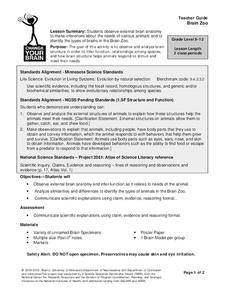




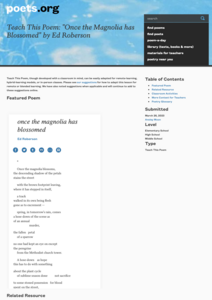
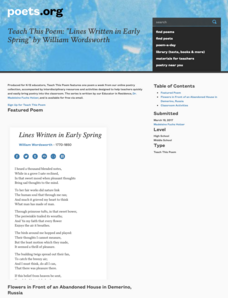


!["From Citizen, VI [On the Train the Woman Standing]," Claudia Rankine Lesson Plan "From Citizen, VI [On the Train the Woman Standing]," Claudia Rankine Lesson Plan](http://content.lessonplanet.com/resources/thumbnails/456347/large/u2nyzwvuc2hvdf8ymdizltazlte3x2f0xzeyljexljq2x1bnlnbuzw.png?1679080322)





